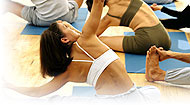health guides
Tendinitis

About This Condition
Tendinitis is a condition where a tendon or the connective tissue that surrounds the tendon becomes inflamed.
This is often due to overuse (e.g., repetitive work activities), acute injury, or excessive exercise. People who are at higher risk of developing tendinitis include athletes, manual laborers, and computer keyboard users. Occasionally, tendinitis may be due to diseases that affect the whole body, such as rheumatoid arthritis or gout.
The most common sites of tendinitis are the shoulder, elbow, forearm, thumb, hip, hamstring muscles (in the back of the upper leg), and Achilles tendon (behind the ankle).1
Symptoms
People with tendinitis may have symptoms, which appear after injury or overuse, including swelling, redness, tenderness, and sharp pain in the affected area, which is worsened with movement or pressure.
Healthy Lifestyle Tips
Many people suffer from tendinitis as a result of their work environment. Studies have shown that tendinitis of the wrist, hands, and fingers are often caused by repetitive work and physical stress.2, 3, 4 Physical changes to the work environment, such as setting up the work station so that the body is in a balanced, untwisted position, minimising the need to use excessive force, avoiding overuse of any one joint, changing positions frequently, and allowing for rest periods, have all been shown to diminish symptoms of lower arm tendinitis.5 One study of computer workers with arm and wrist tendinitis found that using an ergonomic keyboard versus a standard keyboard reduced the severity of pain and improved hand function after six months of use.6
Holistic Options
Acupuncture may be helpful for treating tendinitis. A controlled trial compared acupuncture to sham (fake) acupuncture in people with shoulder tendinitis and found that acupuncture treatment produced significantly higher scores on a combined measurement of pain, ability to perform daily activities, ability to move shoulder without pain, and strength.7 This study also reported that the beneficial effects of acupuncture continued for at least three months following treatment. Another controlled study found traditional “deep” acupuncture more effective than superficial acupuncture for tennis elbow immediately after a series of ten treatments, but at 3 to 12 months’ follow up, both treatment groups had improved similarly.8 A third controlled study found no benefit from ten treatments of laser acupuncture for tennis elbow.9
Certain treatments used by physicians and other doctors have been shown to be effective for tendinitis. In a controlled trial, patients with tendinitis of the shoulder received 24 treatments over six weeks of either ultrasound or a sham treatment.10 Ultrasound resulted in considerable improvement in pain level and overall quality of life, but many of the patients had their original symptoms return after nine months. The use of ultrasound for tennis elbow has not been validated, according to a systematic review of controlled studies.11 One controlled trial compared the effects of ultrasound alone to ultrasound plus a topical steroid medication (a process known as phonophoresis, where ultrasound is used to drive a substance into the skin).12 Both of these treatments were given three times per week for three weeks and both produced similar reductions in pain and tenderness.
Preliminary studies have suggested that daily use of TENS (transcutaneous electrical nerve stimulation) for one to two weeks reduces or eliminates pain in patients with tendinitis.13, 14 Controlled studies are needed to confirm these findings.
Copyright © 2024 TraceGains, Inc. All rights reserved.
Learn more about TraceGains, the company.
The information presented by TraceGains is for informational purposes only. It is based on scientific studies (human, animal, or in vitro), clinical experience, or traditional usage as cited in each article. The results reported may not necessarily occur in all individuals. Self-treatment is not recommended for life-threatening conditions that require medical treatment under a doctor's care. For many of the conditions discussed, treatment with prescription or over the counter medication is also available. Consult your doctor, practitioner, and/or pharmacist for any health problem and before using any supplements or before making any changes in prescribed medications. Information expires December 2024.


 We are proud to announce that
We are proud to announce that  As the market evolves, customers increasingly request a wider variety of omega-3 options for their lipid...
As the market evolves, customers increasingly request a wider variety of omega-3 options for their lipid...  Maintaining healthy glucose levels is crucial for preventing metabolic conditions like diabetes,...
Maintaining healthy glucose levels is crucial for preventing metabolic conditions like diabetes,...  Looking at formulating a new vitamin blend? Discover
Looking at formulating a new vitamin blend? Discover 







































